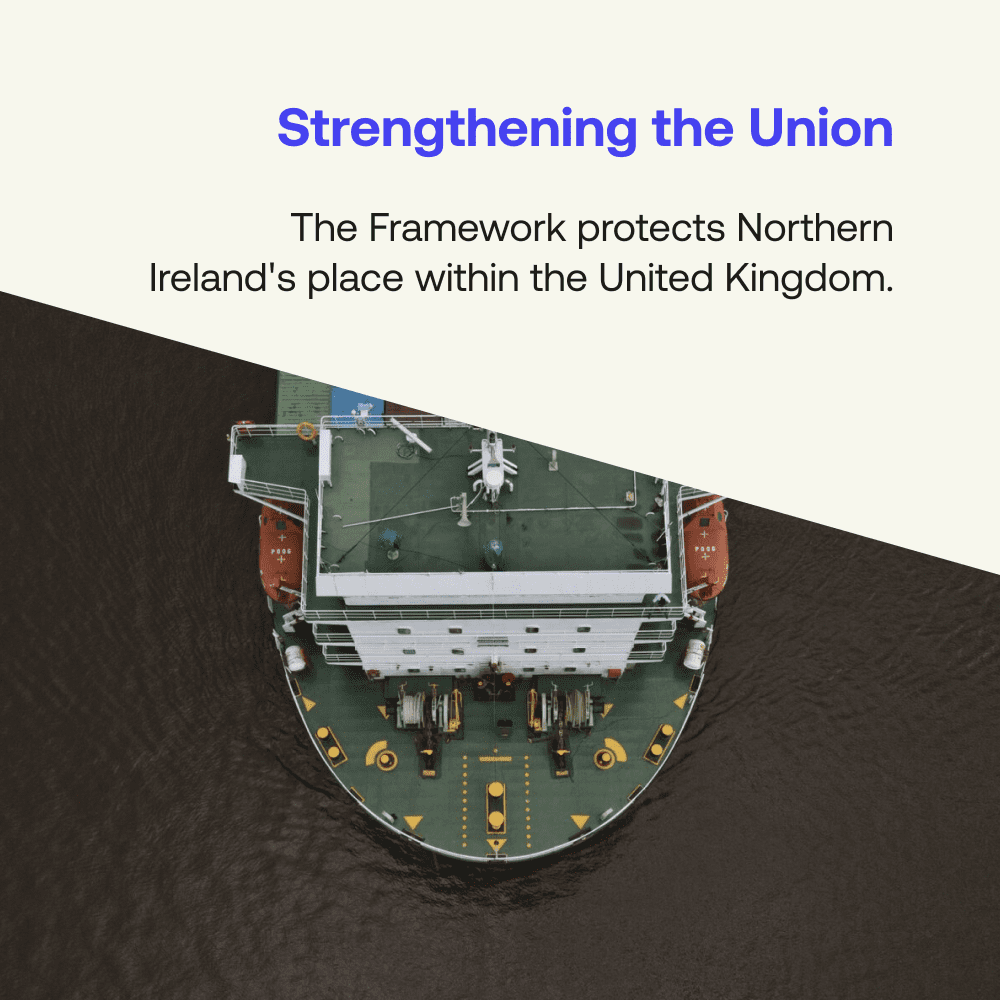Fast & Accurate ENS GB & EU ICS2 Solutions Built for You.
Windsor Framework: A Guide to GB-NI Trade
-
Freya Jane
- Director of Customer's Success
Moving goods from Great Britain (GB) to Northern Ireland (NI)? You must be aware of the changes to the legal requirements, particularly in terms of documentation and tariffs.
In the post-Brexit landscape, the UK and the EU signed an agreement named the Windsor Framework with the goal of addressing the issues raised by the Northern Ireland Protocols. This framework is intended to promote smooth trade between GB and NI with the new, more simplified Green Lane movements.
This blog will walk you through the intricacies of the Windsor Framework, highlighting its crucial elements and implications for both the UK and EU.
What is Windsor Framework?
Windsor Framework is a set of legal agreements between the UK and EU announced on 27 February 2023 to adjust the Northern Ireland Protocols.
Under these Protocols, Northern Ireland (NI) remains a part of the EU single market and aligns with all the related laws and regulations, contrary to the rest of the UK. This makes the movement of goods from Great Britain (GB) to Northern Ireland (NI) more complex.
The Windsor Framework was intended to change the aspect of NI Protocols, particularly to ease the requirement of customs checks on the goods moving from GB.





Windsor Framework Timeline
While some aspects of the Windsor Framework were applied as soon as the Joint Committee adopted it, many changes are being implemented gradually, as described below.
Key Changes in Windsor Framework
The Windsor Framework brings the following three main changes:
1. Restoring the smooth flow of Goods
The major challenge with the original Protocol was the requirements for moving goods from GB to NI. Multiple customs declarations, extensive checks, and even rules of origin requirements, in some cases, were associated with lengthy delays and additional charges.
Green Lane Movements
The Windsor Framework puts in a new set of arrangements for goods movements, i.e., a UK Internal Market Scheme (UKIMS) or Green Lane movements. This means that the goods moving from GB to NI and being used in NI will be free of unnecessary checks, documentation, and duties.
This scheme can benefit businesses in the following ways:
- End the requirement to provide a commodity code for each movement
- Scrap burdensome supplementary declarations
Moreover, the Windsor agreement removes customs checks for certain goods, saving time and costs. For instance, all types of steel can move tariff-free from Great Britain to Northern Ireland.
Agrifood
The Windsor Framework introduces a new legal framework supporting the retail trade of agri-food products in Northern Ireland (NI) via the Northern Ireland Retail Movement Scheme (NIRMS). By 1 October 2024, the new scheme will be replacing the current scheme, i.e., Temporary Agrifood Movement into Northern Ireland (STAMNI).
It simplified documentation for supermarket chain businesses engaged in selling pre-packaged agri-food from GB to NI, which is consumed there.
Retailers, wholesalers, supermarkets, and caterers will be able to move goods with only one certificate per consignment, which will be subject to virtual as well as physical inspections. This will require only a small percentage of a consignment (8% currently, which will be reduced to 5% by 2025).
Additionally, the framework permitted the movement of previously prohibited goods, such as sausages, chilled meat, and plants, with simplified paperwork into the NI.
Parcels
Contrary to the old protocols, the Windsor protocol eliminated the requirement of a full customs declaration for parcel deliveries from Great Britain to Northern Ireland. Posts and parcels being sent to friends and families in NI will be free of complicated customs procedures; this is also applicable to online retailers.
Customs declarations can usually be required in the following cases:
- Goods are restricted or prohibited
- Goods are being sent from one business to another with a value of more than £135.
To avoid paying taxes unnecessarily on the parcels, you must consider joining the UK Internal Market Scheme (UKIMS) for the declaration of “not at risk” goods.
Learn more about four schemes of Windsor Framework with our detailed guide.
2. Safeguarding Northern Ireland’s place in the Union
The agreement placed exemptions on VAT, excise, medicines, plants, seeds, and pets moving from GB to NI to protect Northern Ireland’s place in the European Union.
VAT and excise
As per the old protocol, the European Union’s VAT and excise rules are being applied in Northern Ireland to avoid a hard border.
This is challenging for UK businesses, particularly those engaged in selling goods in the NI sourced from the GB. This constrained the NI in what VAT changes could apply, as it must stay in line with the EU VAT structure.
The Windsor Framework introduced the principle that Northern Ireland now has the same flexibility on VAT and excise as the rest of the UK. It provided specific VAT provisions to the NI.
Similar to the rest of the UK, Northern Ireland will now be able to apply the reduced VAT rates and lower excise duty rates on certain goods. The NI businesses will no longer have to comply with the EU VAT and excise rules, diminishing the administrative burdens.
Medicines
Under the old protocols, Northern Ireland must follow the European Union’s rules on medicines licensing and measures to control quality and counterfeit products.
All the medicines moving in Northern Ireland are approved by the European Medicines Agency (EMA) and must comply with the EU’s laws regarding medicines.
The major issue is that Northern Ireland depends heavily on medicines sourced from Great Britain. The manufacturers that serve both Northern Ireland and Great Britain will have to comply with the two different regulatory requirements, which adds more complexities and costs.
To address these issues, the framework introduced a principle by which medicines in the NI must only be approved by the UK’s Medicines and Healthcare products Regulatory Agency (MHRA). This eliminates the separate packaging or labelling requirements for the medicines sold in the NI, reducing the costs and streamlining the supply chain.
Plants, seeds, trees, and machinery
The plants and plant products had to pass a series of checks and certification requirements when moving from Great Britain and Northern Ireland. This agreement introduces the Northern Ireland Plant Health Lable (NIPHL) scheme that allows you to move any of the following items into the NI without requiring additional certificates:
- Plants and seeds
- Used forestry and agricultural machinery
Subsidy control
According to the old protocol, subsidies affecting the NI and EU trade fall under the EU’s aid regime and may require approval from the European Commission if the subsidies exceed a certain limit.
This is challenging for Northern Ireland’s businesses as they may have to comply with the European Union’s regime, which adds more complexity.
The agreement imposes a set of tests to find whether the subsidies have a genuine and direct link with Northern Ireland. Only subsidies having a material effect on the beneficiaries in the NI will be subject to the EU’s aid rules.
Pets
People moving pets, such as ferrets, cats, and dogs, from Great Britain to Northern Ireland must submit an animal health certificate signed by a vet. The new agreement exempts the requirement for additional certificates and checks.
3. Addressing the democratic deficit
The old protocol applied a number of European Union rules in Northern Ireland to prevent hard border. This protocol was a part of the Brexit Withdrawal Agreement signed in 2019.
A hard border could disrupt the Good Friday Agreement, leading to violence throughout the region. To avoid this, the protocol applied some European Union rules in Northern Ireland, allowing NI businesses to trade freely with the EU.
Problems with old protocols:
Protocol created an imbalance between various aspects of the Goods Friday Agreement, which may lead to a disproportionate burden on the NI’s role in the UK internal market.
The Northern Ireland Assembly had not officially given any statements in favour of EU rules that applied in the NI, leading to concern about democratic accountability.
How does Windsor Framework address these issues?
Removes EU laws
The agreement eliminates 1700 pages of EU regulations applied in the NI, allowing the UK to have more control over its own rules in retail trade, medicines, and agriculture.
As per this agreement, the number of EU rules being applied in the NI is reduced to less than 3%, giving the UK more freedom to set up its own policies.
Democratic consent
The new framework introduces a robust democratic safeguard called “Stormont Brake,” which empowers the Northern Ireland Assembly to change EU rules that apply in the NI. The assembly is now powerful enough to block the EU rules if it believes they will impact everyday life or can be harmful to Northern Ireland.
UK-EU cooperation
The framework set in place new mechanisms for the UK-EU cooperation in order to ensure that the agreement is being implemented and followed smoothly. It helps avoid any potential issues and facilitate simplified goods movement from GB to NI.
The bottom line
The Windsor Framework simplifies the movement of goods from Great Britain to Northern Ireland by enhancing the flexibility of NI protocols. All the exemptions will be applicable to the goods destined to remain in the NI (not at risk goods) and not to be moved to the European Union single market. The agreement will allow the easier movement of goods with reduced tariffs, paperwork, and other document requirements.
Having trouble transporting goods from GB to NI? Let iCustoms handle all your GB-NI movements hassle-freely for all kinds of goods (at risk or not at risk). Book a Demo right away to get a better understanding of the Windsor Framework and streamline your trading with our advanced AI tools.
You may also like:

Let iCustoms help you with the ever-changing landscape of the GB-NI trade with our innovative solutions!
Automate Your Customs Process
Reduce Paperwork, Improve Accuracy & Enhance Customs Compliance
About iCustoms
Automate Your Customs Process
Reduce Paperwork, Improve Accuracy & Enhance Customs Compliance
